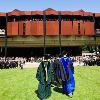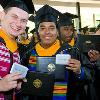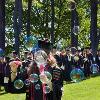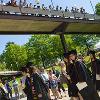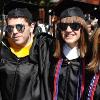For Terence Blanchard, Commencement 2012 was also a reunion
For jazz trumpeter, bandleader, composer and multiple Grammy Award winner Terence Blanchard, Skidmore's 101st Commencement was not just an opportunity to receive his first honorary degree.
It was a reunion.
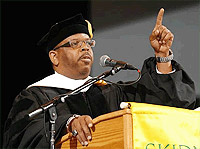
Terence Blanchard
Blanchard met the Class of 2012 four years ago when they were first-year students. As their assigned "summer reading," all had seen Spike Lee's documentary film about the Katrina disaster, When the Levies Broke: A Requiem in Four Acts, for which Blanchard had composed the score. Just a week into the 2008-09 academic year in 2008, Blanchard met with the class in person, making the first of two visits to the campus as that year's McCormack Artist in Residence.
"Your questions made me learn," Blanchard told the 627 bachelor degree candidates Saturday at the Saratoga Performing Arts Center. "Your inquisitiveness inspired me and you need to know that. You need to know what you're worth. You need to know how much you can effect change in the world just by thinking, and doing, and being part of the human race. By being positive."
Blanchard, who in June will participate for the second time in Skidmore's Jazz Institute, was the first of three honorary degree recipients to address the graduates. Following him at lectern were Ron Chernow, winner of the Pulitzer Prize for Washington: A Life, and Suzanne Corbet Thomas '62, chair of Skidmore's Board of Trustees from 2002 to 2008 and a volunteer over the years on some 33 trustee, alumni, and College committees.
Recalling his graduation from Yale in 1970 as a "dreamy, idealistic young English major" and drawing on his own early experience as an unsuccessful writer of fiction before establishing himself as a celebrated writer of historical biographies, Chernow told the graduates that "the most interesting lives are filled with improbable plot twists, with baffled intentions leading to new syntheses and a much deeper fulfillment elsewhere."
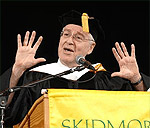
Ron Chernow

Suzanne Corbet Thomas '62
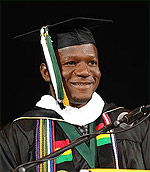
Melvis Langyintuo

Jonathan Zeidan and
Logan Brenner
"Life has a wonderful way of disrupting all of our tidy plans and, just when we thought
we had hit bottom, bringing something newer and fresher and better into being."
"The main point," he continued, "is that no experience in life, however disastrous
it may seem at the time, is ever truly wasted. As Ralph Waldo Emerson once said –
and what would a graduation speech be without a quote from Emerson? – "Nature is a
rag merchant who works up every shred and end into new creations."
Introduced by Mary Lynn, professor of American Studies, as an alumna so deeply committed to Skidmore that "she put her children to sleep by singing them the alma mater," Thomas urged the graduates to "listen to your unique voice."
"That's where your strength lies. Follow it and make a life that matters."
"With that Skidmore self-confidence you have gained, you can 'think big' and, in the words of Steve Jobs, 'make a dent in the universe," she concluded.
Janet Lucas Whitman '59, Thomas's successor as board chair, had delivered the welcoming remarks. It was a poignant moment, because she had just the day before handed her gavel to Linda Toohey, who is succeeding her as board chair.
Pointing at the College's Goals for Student Learning and Development as the faculty's "expression of the transformative power of liberal education," President Philip A. Glotzbach told the graduates that "the intellectual and ethical tool kit you have acquired through your Skidmore education provides you the best possible foundation for success in a world marked above all by rapid, persistent, and unpredictable change."
Chosen by the graduates to speak on behalf of the faculty, Grace Burton, associate professor of Spanish and recipient of the College's Ralph Ciancio Prize for Excellence in Teaching, spoke of the power of nothing – or zero – in Western thought and challenged the graduates to embrace the "nothings" – such as silence, space, disappointment and loss – that "will in time force you to conceive of life in a different way…and put your life on a different path."
"They are the nothings that will enable you to achieve wisdom," she said.
Melvis Langyintuo, president of the senior class, urged his classmates to think of their experiences at Skidmore as a vast book that remains forever open and to which new chapters are constantly added.
"Despite how highly individualized each of the 627 chapters has become, the next chapter of our book might justly be titled, 'Creative Thought Matters: Create the Future,'" he said.
Senior Logan Brenner and Jonathan Zeidan reported that – thanks to the generosity of 400 seniors and an alumnus who matched all gifts made prior to February 15 – the Senior Gift Fund raised $7,981 to be awarded as a scholarship to rising senior next fall.
Making her first appearance at Commencement as president of the Skidmore College Alumni Association, Gail Dudack '70, P'11 encouraged the graduates to view participation in the Association as a "path to new Skidmore friendships, new experiences, and, for many of us, to receive, and then give, career mentoring."
"To be a Skidmore alum is not a spectator sport, so we ask you to give of your time and resources to help improve the Skidmore network and to make the whole Skidmore community stronger."

